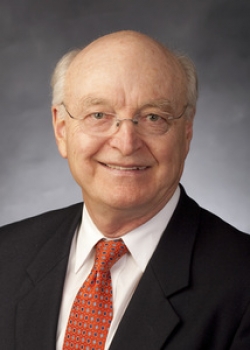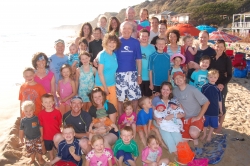Q&A with Professor Robert Crawford
PROVO, Utah – Jan 14, 2013 – Dr. Robert Crawford, associate professor of managerial economics at the Marriott School of Management, is celebrating his forty-first year at Brigham Young University. Crawford grew up outside of Burdett, Alberta, Canada — a village of only 150 people — in a small community of eight families situated on the south bank of the South Saskatchewan River. He received a bachelor of science in economics from Brigham Young University in 1967. He went on to receive a master and doctorate degree in economics from Carnegie Mellon University.
As he looks forward to his retirement in July 2013, he is also looking back at many rewarding years. We sat down with Crawford to ask him about his experience at BYU and his future plans after he retires.
Q: How long have you been on the faculty at BYU?
A: It is my forty-first year with the faculty. It is and has been a rich and rewarding academic career. All of my children have graduated from BYU: three MBAs, two MAcc degrees from the Marriott School, one with a BA in Nursing, and one with a BA in English. Four of them were brave enough to take one or more classes from me. Being at BYU with my children helped improve our relationships.
Q: How did you feel about your first day of teaching?
A: I was a graduate teaching assistant when I taught my first class. I was studying as a first-year graduate student in economics and taught two classes in introductory economics for a year. I enjoyed the experience so much that it confirmed my choice of getting a PhD and becoming a professor.
Q: What’s your favorite class to teach and why?
A: My favorite class was the joint ethics and religion class I taught at one point. I used the question Jesus asked — “what manner of man ought ye to be?” — to critique the assumption that economics is based on the natural man’s outlook.
In the class, students learned to use ethics to present gospel principles in business communication and also be politically correct.
A good example is the parable of the Good Samaritan — a classic story of ethics. Our personal freedom is called into question by the presence of others. In the parable, a Priest and a Levite encounter a person mugged on the road way to Jericho. The freedom of the Priest and the Levite is called into question as they encounter the wounded man. The full implication of this parable was the core foundation of the class.
Q: What is your specialty area of research?
A: My specialties or interests are several: a practical issue of valuing special purpose property for tax purposes and money — money as ethics and money that is essential to one’s self-identity. The last two are ideas I have been working on for several years and look forward to studying more.
Q: What will you miss most about leaving BYU?
A: My regular association with very bright, energetic, and capable colleagues and students who are anxious to learn how to think broadly about the importance of their life’s work in global environment of business.
Q: Do you remember any of the professors from when you were a student? Which were most influential in your learning and teaching?
A: BYU professors I remember are Dean Rickenbach, Larry Wimmer, Richard Wirthlin, Truman Madsen (who was also my mission president), Robert K. Thomas, Bob Parsons, and David Yarn. They were influential in my learning and teaching.
The most influential professor I had is Armen Alchian, now an emeritus professor of economics at UCLA. He helped arrange my post-doctoral year at UCLA where we collaborated on a paper entitled “Vertical Integration, Appropriable Quasi-Rents and the Competitive Contracting Process.” The paper has since become renown in several disciplines — a result not expected at the time of its publication in the Journal of Law and Economics. I first became acquainted with Armen through using his text “University Economics” in preparation for passing my PhD qualifying exams at Carnegie Mellon University. Subsequently, I was asked to host Armen several times as a visiting professor at BYU because he loved to play golf wherever he went and I was the only faculty member in the economics department who had some basic golf skill. As a result, we became good friends as well as colleagues.
Q: What exciting plans do you have for retirement? And, what are you most looking forward to doing?
A: No immediate plans that I would label exciting. My wife and I are contemplating a mission in the future which is exciting. I am looking forward to having more freedom to visit children and grandchildren. We have seven children and will soon have twenty-eight grandchildren. I am also looking forward to continuing an ongoing research project on money and self.
Writer: Breckyn Wood





